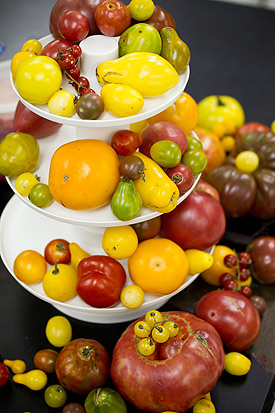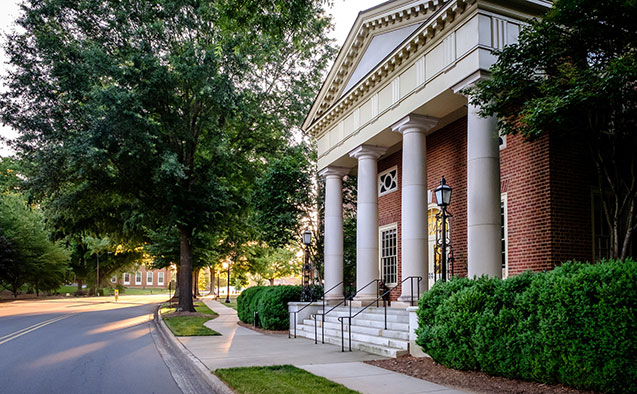Teaching with tomatoes
When teaching about genetics, biology professor Gloria Muday starts her day by harvesting the most dynamic heirloom tomatoes she can find in the Wake Forest campus garden.
She carefully packs them into plastic bins, along with funnels, test tubes, filters and other basic lab equipment. With the assistance of graduate students Stacey Lundy and Rachel Hillyer and Professor Carole Browne, she also brings along handouts, charts, young tomato seedlings … and a handful of Biology 101 students.
When the campus garden was founded in 2009, Muday started growing heirloom tomatoes. That first year, she brought a few heirlooms to a local middle school as a show-and-tell style presentation about genetic diversity. Over the next two years, to make the presentation more interactive, she worked with Biology and Education undergraduate and graduate students and faculty members to develop the “Teaching with Tomatoes” program, which brings Wake Forest biology students to local middle and high schools to teach fundamental biology concepts using the fruit, and uses public engagement to reinforce the lessons they have learned in class.
 Muday estimates “Teaching with Tomatoes” has reached more than 1,200 students in the Winston-Salem/Forsyth County Schools this semester. Ben Spell’s class at Parkland High School eagerly anticipated their lesson about how genetics are responsible for the diversity and variety in heirloom tomatoes, such as fruit size, shape, color and taste.
Muday estimates “Teaching with Tomatoes” has reached more than 1,200 students in the Winston-Salem/Forsyth County Schools this semester. Ben Spell’s class at Parkland High School eagerly anticipated their lesson about how genetics are responsible for the diversity and variety in heirloom tomatoes, such as fruit size, shape, color and taste.
“I’m as happy as I can be,” said Spell. “My students are just excited. They’ve been stopping by all morning asking about class today.”
Under the guidance of Muday and Browne, pairs of Wake Forest undergraduates took small groups of Parkland students through a problem-based learning exercise to help them figure out why a tomato might bear fruits of a different color. In the process, they learned about dominant and recessive genes and the genetic influence on the characteristics we can see and the ones we cannot. Students filled out Punnett squares to predict gene combinations, examined young tomato plants and even extracted the DNA from one of the fruits.
“The material we teach is all part of the seventh grade and high school class curriculum, they just might not have gotten there yet. The goal is to provide memorable examples, so that when the students reach their genetic unit, they can call on this experience to build a stronger understanding of these critical course concepts,” explained Muday. “The local students aren’t the only ones who benefit from ‘Teaching with Tomatoes.’ It’s also a way for very talented Wake Forest students who are not science majors to see that biology is relevant.”
This program, funded by the American Society of Plant Biology Education Foundation, helps the local students learn important genetic concepts from instructors to whom they can easily relate. It also helps cement the concepts for the Wake Forest students and gives them a newfound respect for the work their professors do every day.
“It’s a totally different world between writing answers for a test and being able to teach,” said Daniel Sechtin (‘16). “Once you learn the teaching side and the student side, you have a real appreciation for the learning process.”
Samantha Larsen (‘16) agreed, “I like interacting with other students and taking what we learn in class and bringing it to them. I definitely understand what we’ve been teaching a lot more.”
Perhaps even more valuable than the fundamental biology concepts this program seeks to instill are the conversations about higher learning that take place between the Wake Forest students and the middle and high schoolers who see them as role models. The program builds in ample time for local students to ask about their own educational futures. What is college like? Is it fun? Is it hard? What are the labs like? What is the social life like?
“The most valuable thing about this program is having Wake show an interest in high school students, preparing them for college,” said Spell.
With any luck, some of these local students may lead their own Teaching With Tomatoes courses one day.
Categories: Community Impact, Research & Discovery
Media Contact
Wake Forest News
media@wfu.edu
336.758.5237



